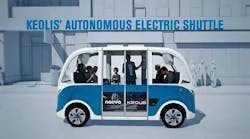NAVYA AUTONOM Shuttle Becomes First American-Made A.V. Permanently Deployed on Open Roads in Canada
Keolis Canada and the City of Candiac, with the manufacturer NAVYA, financial support from the Québec Government, the collaboration of Propulsion Québec, the Cluster for Electric and Smart Transportation and the Technopôle IVÉO, are pleased to officially announce the first long-term demonstration project of a 100 percent electric autonomous shuttle on public roads in Canada. The NAVYA Autonom Shuttle will operate in mixed traffic, this is a first step towards integrating autonomous shuttles into shared transportation solutions, in addition to complement the existing transport offer. The pilot project will begin in the summer 2018 for a period of 12 months, including 8 months at the service of citizens. During the winter, a research and development project to test the shuttle in Québec cold weather conditions will take place without passengers on board.
For this project, Keolis has obtained financial support of 350,000 $ from the Ministry of Economy, Science and Innovation as part of the measure to support demonstration projects in the action plan in favor of the industry of ground transportation and sustainable mobility.
The NAVYA Autonom Shuttle will operate along a two-km route between the exo park-and-ride lot and the bus terminal and the intersection of Marie-Victorin and Montcalm North Boulevards with several stops along the way, including City Hall, retirement housing and local businesses. The shuttle will also allow employees in the area to reach their workplaces from the bus terminal. In addition, the CAA-Québec Foundation for road safety, with the support of partners, is evaluating the possibility of conducting an independent study on road safety and social acceptance in this project. The lessons learnt would offer precious insights with a clear goal of maintaining, without condition, harmony between vehicles sharing the road.
“Keolis Canada has strong expertise in developing mobility solutions tailored to different communities and improving passengers’ travel options and habits. The autonomous electric shuttle complements Candiac’s existing transportation offer and is yet another step towards integrated intermodal transportation services," says Marie Hélène Cloutier, Vice-President, Passenger Experience, Marketing & Sales for Keolis Canada. Patrick Gilloux, president and chief operating officer of Keolis Canada added: "We are very excited to launch this project in Québec. Keolis is investing in new shared electric mobility services because it is an important cornerstone for the future of public transportation.”
“Candiac places great importance on public and active transport. We are constantly working to provide additional multimodal transportation options while remaining steadfastly focused on the notions of sustainable development and the smart city. A true showcase of technological advancements, the autonomous electric shuttle project put forth by Keolis Canada and NAVYA is perfectly aligned with our vision in terms of innovation and is at the heart of our 2014–2029 strategic development plan. We are extremely proud to be the first city in Canada to move forward with a project of this nature,” stated Normand Dyotte, mayor of Candiac.
“NAVYA is proud to work with our partner Keolis Canada and the City of Candiac on this important milestone in Canadian transportation. This project embodies NAVYA’s vision of autonomous shared mobility and fills an important transportation need for which our shuttles were designed. We commend Québec for its collaborative efforts to complement existing transportation options,” said NAVYA’s CEO, Christophe Sapet. “NAVYA is an ideal partner for municipalities that take a sustainable and viable approach to transportation. Our autonomous shuttles are operating in 17 countries, and we’re pleased to welcome Canada to the list of forward-thinking nations.”
“The autonomous shuttle project in Candiac is a first in several ways for the electric and smart transportation industry of Québec. One of the main benefits of autonomous transportation is to improve passengers’ experience, especially within areas that are not currently served by collective transport offer, such as the first and last kilometers of a trip, without having to add heavy infrastructures,” said Sarah Houde, executive director of propulsion Québec. "This progress will also contribute to the development and adoption of a regulatory framework, practices and public policies that will foster the development, testing and marketing of electric and intelligent vehicles, one of Propulsion Québec's principal mandates. This is a great achievement that will benefit the community and members of the Cluster.”
"IVÉO is pleased to contribute to the development of this demonstration project. It is important for us to respond to all types of mobility issues in small and medium-sized cities. With this project, we address Candiac's specific concerns, and we are able to make the right link between the service offered by Keolis and the municipality's decision-makers. Québec's presence in the new mobility ecosystem is crucial, and this is a good example of what we can do in a collaborative environment," added Benoit Balmana, chief executive at IVÉO.
“The CAA-Québec Foundation for road safety is particularly interested to study the different considerations that the arrival of this new autonomous mobility on our roads rise and, incidentally, to road sharing at large. The impact on users, being pedestrians, cyclists or car drivers, must be evaluated for a harmonious and safe road sharing. Therefore, we are seriously considering the possibility to measure social acceptance of this autonomous mobility as part of such a stimulating and promising project”, underlined Marco Harrison, director of the CAA-Québec Foundation.
